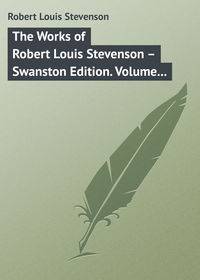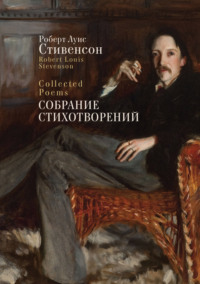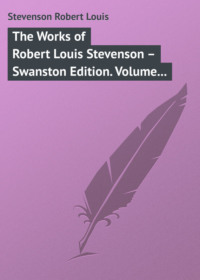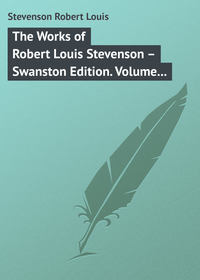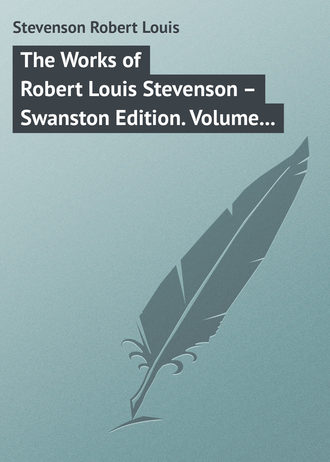 полная версия
полная версияThe Works of Robert Louis Stevenson – Swanston Edition. Volume 10
Then the dirks were put up, our weapons were taken away, and we were set face to face, sitting in the heather.
“They are Cluny’s men,” said Alan. “We couldna have fallen better. We’re just to bide here with these, which are his out-sentries, till they can get word to the chief of my arrival.”
Now Cluny Macpherson, the chief of the clan Vourich, had been one of the leaders of the great rebellion six years before; there was a price on his life; and I had supposed him long ago in France, with the rest of the heads of that desperate party. Even tired as I was, the surprise of what I heard half wakened me.
“What,” I cried, “is Cluny still here?”
“Ay is he so!” said Alan. “Still in his own country and kept by his own clan. King George can do no more.”
I think I would have asked further, but Alan gave me the put-off. “I am rather wearied,” he said, “and I would like fine to get a sleep.” And without more words he rolled on his face in a deep heather bush, and seemed to sleep at once.
There was no such thing possible for me. You have heard grasshoppers whirring in the grass in the summer-time? Well, I had no sooner closed my eyes than my body, and above all my head, belly, and wrists, seemed to be filled with whirring grasshoppers; and I must open my eyes again at once, and tumble and toss, and sit up and lie down; and look at the sky which dazzled me, or at Cluny’s wild and dirty sentries, peering out over the top of the brae and chattering to each other in the Gaelic.
That was all the rest I had, until the messenger returned; when, as it appeared that Cluny would be glad to receive us, we must get once more upon our feet and set forward. Alan was in excellent good spirits, much refreshed by his sleep, very hungry, and looking pleasantly forward to a dram and a dish of hot collops, of which, it seems, the messenger had brought him word. For my part, it made me sick to hear of eating. I had been dead-heavy before, and now I felt a kind of dreadful lightness, which would not suffer me to walk. I drifted like a gossamer; the ground seemed to me a cloud, the hills a feather-weight, the air to have a current, like a running burn, which carried me to and fro. With all that, a sort of horror of despair sat on my mind, so that I could have wept at my own helplessness.
I saw Alan knitting his brows at me, and supposed it was in anger; and that gave me a pang of light-headed fear, like what a child may have. I remember, too, that I was smiling, and could not stop smiling, hard as I tried; for I thought it was out of place at such a time. But my good companion had nothing in his mind but kindness; and the next moment two of the gillies had me by the arms, and I began to be carried forward with great swiftness (or so it appeared to me, although I daresay it was slowly enough in truth), through a labyrinth of dreary glens and hollows, and into the heart of that dismal mountain of Ben Alder.
CHAPTER XXIII
CLUNY’S CAGE
We came at last to the foot of an exceeding steep wood, which scrambled up a craggy hill-side, and was crowned by a naked precipice.
“It’s here,” said one of the guides, and we struck up hill.
The trees clung upon the slope, like sailors on the shrouds of a ship; and their trunks were like the rounds of a ladder, by which we mounted.
Quite at the top, and just before the rocky face of the cliff sprang above the foliage, we found that strange house which was known in the country as “Cluny’s Cage.” The trunks of several trees had been wattled across, the intervals strengthened with stakes, and the ground behind this barricade levelled up with earth to make the floor. A tree, which grew out from the hillside, was the living centre-beam of the roof. The walls were of wattle and covered with moss. The whole house had something of an egg-shape; and it half hung, half stood in that steep, hill-side thicket, like a wasps’ nest in a green hawthorn.
Within, it was large enough to shelter five or six persons with some comfort. A projection of the cliff had been cunningly employed to be the fireplace; and the smoke, rising against the face of the rock, and being not dissimilar in colour, readily escaped notice from below.
This was but one of Cluny’s hiding-places; he had caves, besides, and underground chambers in several parts of his country; and, following the reports of his scouts, he moved from one to another as the soldiers drew near or moved away. By this manner of living, and thanks to the affection of his clan, he had not only stayed all this time in safety, while so many others had fled or been taken and slain; but stayed four or five years longer, and only went to France at last by the express command of his master. There he soon died; and it is strange to reflect that he may have regretted his Cage upon Ben Alder.
When we came to the door he was seated by his rock chimney, watching a gillie about some cookery. He was mighty plainly habited, with a knitted nightcap drawn over his ears, and smoked a foul cutty pipe. For all that he had the manners of a king, and it was quite a sight to see him rise out of his place to welcome us.
“Well, Mr. Stewart, come awa’, sir!” said he, “and bring in your friend that as yet I dinna ken the name of.”
“And how is yourself, Cluny?” said Alan. “I hope ye do brawly, sir. And I am proud to see ye, and to present to ye my friend the Laird of Shaws, Mr. David Balfour.”
Alan never referred to my estate without a touch of a sneer when we were alone; but with strangers he rang the words out like a herald.
“Step in by, the both of ye, gentlemen,” says Cluny. “I make ye welcome to my house, which is a queer, rude place for certain, but one where I have entertained a royal personage, Mr. Stewart – ye doubtless ken the personage I have in my eye. We’ll take a dram for luck, and as soon as this handless man of mine has the collops ready, we’ll dine and take a hand at the cartes as gentlemen should. My life is a bit dreigh,” says he, pouring out the brandy; “I see little company, and sit and twirl my thumbs, and mind upon a great day that is gone by, and weary for another great day that we all hope will be upon the road. And so here’s a toast to ye: The Restoration!”
Thereupon we all touched glasses and drank. I am sure I wished no ill to King George; and if he had been there himself in proper person, it’s like he would have done as I did. No sooner had I taken out the dram than I felt hugely better, and could look on and listen, still a little mistily perhaps, but no longer with the same groundless horror and distress of mind.
It was certainly a strange place, and we had a strange host. In his long hiding, Cluny had grown to have all manner of precise habits, like those of an old maid. He had a particular place, where no one else must sit; the Cage was arranged in a particular way, which none must disturb; cookery was one of his chief fancies, and even while he was greeting us in, he kept an eye to the collops.
It appears, he sometimes visited or received visits from his wife and one or two of his nearest friends, under the cover of night; but for the more part lived quite alone, and communicated only with his sentinels and the gillies that waited on him in the Cage. The first thing in the morning, one of them, who was a barber, came and shaved him, and gave him the news of the country, of which he was immoderately greedy. There was no end to his questions; he put them as earnestly as a child; and, at some of the answers, laughed out of all bounds of reason, and would break out again laughing at the mere memory, hours after the barber was gone.
To be sure, there might have been a purpose in his questions; for though he was thus sequestered, and, like the other landed gentlemen of Scotland, stripped by the late Act of Parliament of legal powers, he still exercised a patriarchal justice in his clan. Disputes were brought to him in his hiding-hole to be decided; and the men of his country, who would have snapped their fingers at the Court of Session, laid aside revenge and paid down money at the bare word of this forfeited and hunted outlaw. When he was angered, which was often enough, he gave his commands and breathed threats of punishment like any king; and his gillies trembled and crouched away from him like children before a hasty father. With each of them, as he entered, he ceremoniously shook hands, both parties touching their bonnets at the same time in a military manner. Altogether, I had a fair chance to see some of the inner workings of a Highland clan; and this with a proscribed, fugitive chief; his country conquered; the troops riding upon all sides in quest of him, sometimes within a mile of where he lay; and when the least of the ragged fellows whom he rated and threatened could have made a fortune by betraying him.
On that first day, as soon as the collops were ready, Cluny gave them with his own hand a squeeze of a lemon (for he was well supplied with luxuries) and bade us draw into our meal.
“They,” said he, meaning the collops, “are such as I gave His Royal Highness in this very house; bating the lemon juice, for at that time we were glad to get the meat and never fashed for kitchen.28 Indeed, there were mair dragoons than lemons in my country in the year ’Forty-six.”
I do not know if the collops were truly very good, but my heart rose against the sight of them, and I could eat but little. All the while Cluny entertained us with stories of Prince Charlie’s stay in the Cage, giving us the very words of the speakers, and rising from his place to show us where they stood. By these, I gathered the Prince was a gracious, spirited boy, like the son of a race of polite kings, but not so wise as Solomon. I gathered, too, that while he was in the Cage he was often drunk; so the fault that has since, by all accounts, made such a wreck of him, had even then begun to show itself.
We were no sooner done eating than Cluny brought out an old, thumbed, greasy pack of cards, such as you may find in a mean inn; and his eyes brightened in his face as he proposed that we should fall to playing.
Now this was one of the things I had been brought up to eschew like disgrace; it being held by my father neither the part of a Christian nor yet of a gentleman to set his own livelihood, and fish for that of others, on the cast of painted pasteboard. To be sure, I might have pleaded my fatigue, which was excuse enough; but I thought it behoved that I should bear a testimony. I must have got very red in the face, but I spoke steadily, and told them I had no call to be a judge of others, but for my own part, it was a matter in which I had no clearness.
Cluny stopped mingling the cards. “What in the deil’s name is this?” says he. “What kind of Whiggish, canting talk is this, for the house of Cluny Macpherson?”
“I will put my hand in the fire for Mr. Balfour,” says Alan. “He is an honest and a mettle gentleman, and I would have ye bear in mind who says it. I bear a king’s name,” says he, cocking his hat; “and I and any that I call friend are company for the best. But the gentleman is tired, and should sleep; if he has no mind to the cartes, it will never hinder you and me. And I’m fit and willing, sir, to play ye any game that ye can name.”
“Sir,” says Cluny, “in this poor house of mine I would have you to ken that any gentleman may follow his pleasure. If your friend would like to stand on his head, he is welcome. And if either he, or you, or any other man, is not preceesely satisfied, I will be proud to step outside with him.”
I had no will that these two friends should cut their throats for my sake.
“Sir,” said I, “I am very wearied, as Alan says; and what’s more, as you are a man that likely has sons of your own, I may tell you it was a promise to my father.”
“Say nae mair, say nae mair,” said Cluny, and pointed me to a bed of heather in a corner of the Cage. For all that he was displeased enough, looked at me askance, and grumbled when he looked. And indeed it must be owned that both my scruples, and the words in which I had declared them, smacked somewhat of the Covenanter, and were little in their place among wild Highland Jacobites.
What with the brandy and the venison, a strange heaviness had come over me; and I had scarce lain down upon the bed before I fell into a kind of trance, in which I continued almost the whole time of our stay in the Cage. Sometimes I was broad awake and understood what passed; sometimes I only heard voices, or men snoring, like the voice of a silly river; and the plaids upon the wall dwindled down and swelled out again, like firelight shadows on the roof. I must sometimes have spoken or cried out, for I remember I was now and then amazed at being answered; yet I was conscious of no particular nightmare, only of a general, black, abiding horror – a horror of the place I was in, and the bed I lay on, and the plaids on the wall, and the voices, and the fire, and myself.
The barber-gillie, who was a doctor too, was called in to prescribe for me; but as he spoke in the Gaelic, I understood not a word of his opinion, and was too sick even to ask for a translation. I knew well enough I was ill, and that was all I cared about.
I paid little heed while I lay in this poor pass. But Alan and Cluny were most of the time at the cards, and I am clear that Alan must have begun by winning; for I remember sitting up, and seeing them hard at it, and a great glittering pile of as much as sixty or a hundred guineas on the table. It looked strange enough to see all this wealth in a nest upon a cliff-side, wattled about growing trees. And even then, I thought it seemed deep water for Alan to be riding, who had no better battle-horse than a green purse and a matter of five pounds.
The luck, it seems, changed on the second day. About noon I was wakened as usual for dinner, and as usual refused to eat, and was given a dram with some bitter infusion which the barber had prescribed. The sun was shining in at the open door of the Cage, and this dazzled and offended me. Cluny sat at the table, biting the pack of cards. Alan had stooped over the bed, and had his face close to my eyes; to which, troubled as they were with the fever, it seemed of the most shocking bigness.
He asked me for a loan of my money.
“What for?” said I.
“O, just for a loan,” said he.
“But why?” I repeated. “I don’t see.”
“Hut, David!” said Alan, “ye wouldna grudge me a loan?”
I would though, if I had had my senses! But all I thought of then was to get his face away, and I handed him my money.
On the morning of the third day, when we had been forty-eight hours in the Cage, I awoke with a great relief of spirits, very weak and weary indeed, but seeing things of the right size and with their honest, everyday appearance. I had a mind to eat, moreover, rose from my bed of my own movement, and as soon as we had breakfasted, stepped to the entry of the Cage and sat down outside in the top of the wood. It was a grey day, with a cool, mild air: and I sat in a dream all morning, only disturbed by the passing by of Cluny’s scouts and servants coming with provisions and reports; for, as the coast was at that time clear, you might almost say he held court openly.
When I returned, he and Alan had laid the cards aside, and were questioning a gillie; and the chief turned about and spoke to me in the Gaelic.
“I have no Gaelic, sir,” said I.
Now, since the card question everything I said or did had the power of annoying Cluny. “Your name has more sense than yourself, then,” said he angrily; “for it’s good Gaelic. But the point is this: my scout reports all clear in the south, and the question is, have ye the strength to go?”
I saw cards on the table, but no gold; only a heap of little written papers, and these all on Cluny’s side. Alan, besides, had an odd look, like a man not very well content; and I began to have a strong misgiving.
“I do not know if I am as well as I should be,” said I, looking at Alan; “but the little money we have has a long way to carry us.”
Alan took his under-lip into his mouth, and looked upon the ground.
“David,” says he at last, “I’ve lost it; there’s the naked truth.”
“My money too?” said I.
“Your money too,” says Alan, with a groan. “Ye shouldna have given it me. I’m daft when I get to the cartes.”
“Hoot-toot! hoot-toot!” said Cluny. “It was all daffing; it’s all nonsense. Of course you’ll have your money back again, and the double of it, if ye’ll make so free with me. It would be a singular thing for me to keep it. It’s not to be supposed that I would be any hindrance to gentlemen in your situation; that would be a singular thing!” cries he, and began to pull gold out of his pocket with a mighty red face.
Alan said nothing, only looked on the ground.
“Will you step to the door with me, sir?” said I.
Cluny said he would be very glad, and followed me readily enough, but he looked flustered and put out.
“And now, sir,” says I, “I must first acknowledge your generosity.”
“Nonsensical nonsense!” cries Cluny. “Where’s the generosity? This is just a most unfortunate affair; but what would ye have me do – boxed up in this bee-skep of a cage of mine – but just set my friends to the cartes, when I can get them? And if they lose, of course, it’s not to be supposed – ” And here he came to a pause.
“Yes,” said I, “if they lose, you give them back their money; and if they win, they carry away yours in their pouches! I have said before that I grant your generosity; but to me, sir, it’s a very painful thing to be placed in this position.”
There was a little silence, in which Cluny seemed always as if he was about to speak, but said nothing. All the time he grew redder and redder in the face.
“I am a young man,” said I, “and I ask your advice. Advise me as you would your son. My friend fairly lost this money, after having fairly gained a far greater sum of yours; can I accept it back again? Would that be the right part for me to play? Whatever I do, you can see for yourself it must be hard upon a man of any pride.”
“It’s rather hard on me too, Mr. Balfour,” said Cluny, “and ye give me very much the look of a man that has entrapped poor people to their hurt. I wouldna have my friends come to any house of mine to accept affronts; no,” he cried, with a sudden heat of anger, “nor yet to give them!”
“And so you see, sir,” said I, “there is something to be said upon my side; and this gambling is a very poor employ for gentle-folks. But I am still waiting your opinion.”
I am sure if ever Cluny hated any man it was David Balfour. He looked me all over with a warlike eye, and I saw the challenge at his lips. But either my youth disarmed him, or perhaps his own sense of justice. Certainly it was a mortifying matter for all concerned, and not least for Cluny; the more credit that he took it as he did.
“Mr. Balfour,” said he, “I think you are too nice and covenanting, but for all that you have the spirit of a very pretty gentleman. Upon my honest word, ye may take this money – it’s what I would tell my son – and here’s my hand along with it!”
CHAPTER XXIV
THE FLIGHT IN THE HEATHER: THE QUARREL
Alan and I were put across Loch Errocht under cloud of night, and went down its eastern shore to another hiding-place near the head of Loch Rannoch, whither we were led by one of the gillies from the Cage. This fellow carried all our luggage and Alan’s great-coat in the bargain, trotting along under the burthen, far less than the half of which used to weigh me to the ground, like a stout hill-pony with a feather; yet he was a man that, in plain contest, I could have broken on my knee.
Doubtless it was a great relief to walk disencumbered; and perhaps without that relief, and the consequent sense of liberty and lightness, I could not have walked at all. I was but new risen from a bed of sickness; and there was nothing in the state of our affairs to hearten me for much exertion; travelling, as we did, over the most dismal deserts in Scotland, under a cloudy heaven, and with divided hearts among the travellers.
For long we said nothing; marching alongside or one behind the other, each with a set countenance; I, angry and proud, and drawing what strength I had from these two violent and sinful feelings: Alan angry and ashamed, – ashamed that he had lost my money, angry that I should take it so ill.
The thought of a separation ran always the stronger in my mind; and the more I approved of it, the more ashamed I grew of my approval. It would be a fine, handsome, generous thing, indeed, for Alan to turn round and say to me: “Go; I am in the most danger, and my company only increases yours.” But for me to turn to the friend who certainly loved me, and say to him: “You are in great danger, I am in but little; your friendship is a burden; go, take your risks and bear your hardships alone – ” no, that was impossible; and even to think of it privily to myself made my cheeks to burn.
And yet Alan had behaved like a child, and (what is worse) a treacherous child. Wheedling my money from me while I lay half-conscious was scarce better than theft; and yet here he was, trudging by my side, without a penny to his name, and, by what I could see, quite blithe to sponge upon the money he had driven me to beg. True, I was ready to share it with him; but it made me rage to see him count upon my readiness.
These were the two things uppermost in my mind; and I could open my mouth upon neither without black ungenerosity. So I did the next worst, and said nothing, nor so much as looked once at my companion, save with the tail of my eye.
At last, upon the other side of Loch Errocht, going over a smooth, rushy place, where the walking was easy, he could bear it no longer, and came close to me.
“David,” says he, “this is no way for two friends to take a small accident. I have to say that I’m sorry; and so that’s said. And now if you have anything, ye’d better say it.”
“O,” says I, “I have nothing.”
He seemed disconcerted; at which I was meanly pleased.
“No,” said he, with rather a trembling voice, “but when I say I was to blame?”
“Why, of course, ye were to blame,” said I coolly; “and you will bear me out that I have never reproached you.”
“Never,” says he; “but ye ken very well that ye’ve done worse. Are we to part? Ye said so once before. Are ye to say it again? There’s hills and heather enough between here and the two seas, David; and I will own I’m no’ very keen to stay where I’m no’ wanted.”
This pierced me like a sword, and seemed to lay bare my private disloyalty.
“Alan Breck!” I cried; and then: “Do you think I am one to turn my back on you in your chief need? You durstn’t say it to my face. My whole conduct’s there to give the lie to it. It’s true, I fell asleep upon the muir; but that was from weariness, and you do wrong to cast it up to me – ”
“Which is what I never did,” said Alan.
“But aside from that,” I continued, “what have I done that you should even me to dogs by such a supposition? I never yet failed a friend, and it’s not likely I’ll begin with you. There are things between us that I can never forget, even if you can.”
“I will only say this to ye, David,” said Alan, very quietly, “that I have long been owing ye my life, and now I owe ye money. Ye should try to make that burden light for me.”
This ought to have touched me, and in a manner it did, but the wrong manner. I felt I was behaving badly; and was now not only angry with Alan, but angry with myself in the bargain; and it made me the more cruel.
“You asked me to speak,” said I. “Well, then, I will. You own yourself that you have done me a disservice; I have had to swallow an affront: I have never reproached you, I never named the thing till you did. And now you blame me,” cried I, “because I canna laugh and sing as if I was glad to be affronted. The next thing will be that I’m to go down upon my knees and thank you for it! Ye should think more of others, Alan Breck. If ye thought more of others, ye would perhaps speak less about yourself; and when a friend that likes you very well has passed over an offence without a word, you would be blithe to let it lie, instead of making it a stick to break his back with. By your own way of it, it was you that was to blame; then it shouldna be you to seek the quarrel.”
“Aweel,” said Alan, “say nae mair.”
And we fell back into our former silence; and came to our journey’s end, and supped, and lay down to sleep, without another word.



